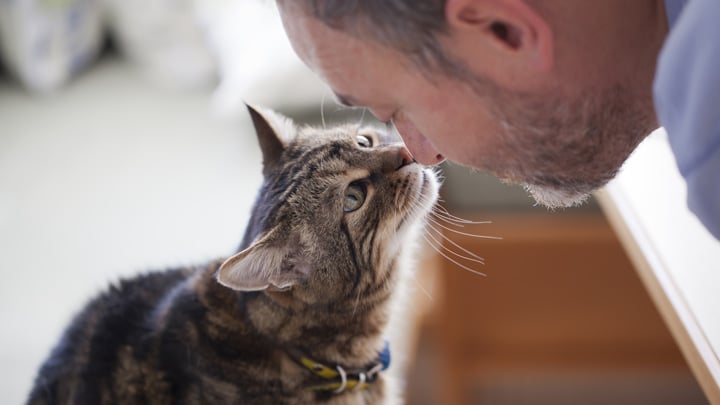Feline Asthma
It’s not just humans who get asthma, cats can suffer too. Learn how to spot the signs and what to do if you suspect your cat has it.

Just like humans, cats can suffer from asthma which can leave them wheezing and struggling to breathe. While there’s no cure, if it’s properly managed, cats with asthma can live long and healthy lives.
What is feline asthma?
Feline asthma is the same as for humans – it’s a chronic inflammation of the airways into the lungs. An allergen will trigger an immune response, causing irritation, inflammation and muscular constriction of the airways.
What causes asthma in cats?
There is no one thing that causes asthma in cats and indeed it’s still unknown why some cats get it, and some don’t. What vets do know is that it’s a condition where the body triggers an overactive immune response to an allergen or stress. Suspected triggers include tobacco smoke, dust mites, pollen, grass, mould, perfume, aerosol sprays, household cleaning products and cat litter.
Cats can develop asthma at any time during their lives though it’s more common between the ages of two and eight. There is a slightly higher prevalence in females and in certain breeds of cat such as Burmese and Siamese.
Symptoms of feline asthma
Cat asthma often starts as a mild but persistent cough which worsens over time. As the body becomes more sensitive to allergens the airways become increasingly narrow and inflamed – this can lead to life-threatening asthma attacks.
Symptoms include:
- Rapid breathing or difficulty breathing
- Persistent coughing
- Lethargy and weakness
- Persistent gagging like they’re trying to dislodge a hair ball
- Difficulty breathing after exertion
- Breathing with their mouth open
- Gasping for breath
- Extending their neck upwards to catch their breath
- Blue lips/gums can indicate lack of oxygen
Diagnosing feline asthma
There are several other conditions with similar symptoms so your vet will want to rule those out first.
You vet will usually listen to your cat’s chest and heart. They may order chest x-rays and carry out tests to determine lung function. These include blood tests or a bronchoalveolar lavage/BAL where cells are collected from your cat’s lungs under anaesthetic, then studied under a microscope.
If tests don’t indicate asthma but your vet strongly suspects it, they’ll often put them on asthma medication and monitor their response.
What are the signs of a feline asthma attack?
If your cat is wheezing or gasping for breath, arching their neck or breathing with their mouth open it can be a sign they’re having an attack. Cats often hunch low to the ground and crane their necks forward with the onset of symptoms.
What should I do if my cat has an asthma attack?
If you suspect your cat is having an attack, try to keep them as calm as possible in a cool and well-ventilated area.
If symptoms are severe i.e., your cat’s sides are visibly heaving, they’re coughing up mucous, drooling and looking frightened, contact your vet straight away.
How to care for a cat with asthma
There are two main treatments for feline asthma:
- Corticosteroids – anti-inflammatory drugs which reduce the inflammation which causes the symptoms
- Bronchodilators – medication which help widen a cat’s airways when required
Medication is either given in the form of an inhaler, injected or in tablet form. Your vet will show you how to use the inhaler – inhalers for cats work differently to humans because you can’t ask a cat to breathe in.
Your vet may also prescribe antihistamines if other medication doesn’t work.
Sometimes asthma can predispose cats to develop secondary infections which may need to be treated with antibiotics.

Can asthma attacks be prevented
As with humans, identifying and removing the allergens which trigger asthma can help reduce the number of attacks your cat suffers. Try to avoid using perfumes, air fresheners, or smoking around your cat. If stress appears to be a trigger create a calm space for your pet to stop them getting upset.
It's also good idea to keep a diary of symptoms so you can begin to track the severity, timings and what might be a triggering them.
How long can cats live with asthma?
Provided your cat’s asthma is well-managed they’ll have a normal lifespan. You can help your cat to live a long and happy life by:
- Getting regular treatment and immune support
- Avoiding triggers
- Monitoring your cat and giving medication as quickly as possible if they suffer an attack
- Keeping their weight healthy
Feline asthma is something you need to be aware of, but it doesn’t mean your pet can’t enjoy a full and happy life. Being aware of the signs and symptoms and keeping on top of their medication can ensure peace of mind for you and ensure they live to a ripe old age in good health.



